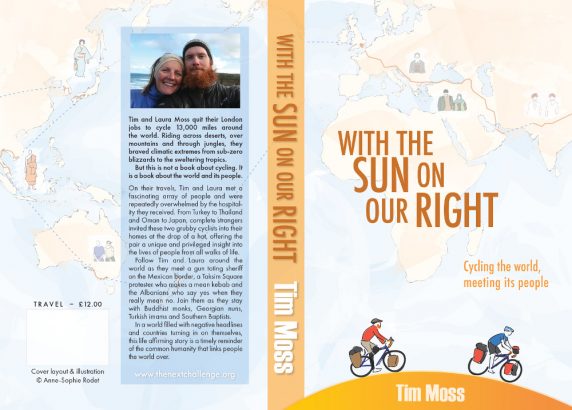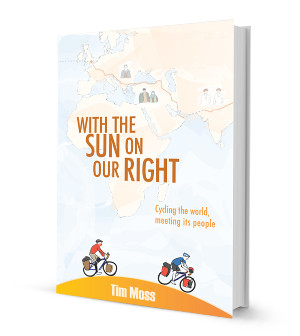In a week’s time I will be sending my book to a printer. I will get several hundred paperbacks delivered to my house, I will sell them on my website and I will post them to customers myself. There will be no publisher involved.
This is a conscious decision and here’s why…

Working with a publisher
In 2011, I wrote my first book and went through a publisher. It felt like a success just being accepted but I remember being surprised by the terms in the contract: effectively, I would get 5% of the sales price.*
I checked with a friend in publishing and was told that this was a fairly typical rate. It means that if you buy my book for £12.00 in Waterstones or on Amazon, I get 60p.
Here is a typical breakdown:
| Sale price | £12.00 |
| Book shop | (6.00) |
| Publisher | (5.40) |
| Contribution to author | £0.60 |
| Margin | 5% |
Twelve pound sale price. Sixty pence for the author.
Making money was never the primary motivation for writing my books but it seems mad to get so little in return for all of that effort into a product (18 months for the first book, over two years for the new one).
*Technically, I get 10% of what the publisher sells the book to a shop for. That’s usually around 50% of the sales price, hence I get around 5%.
Self-publishing
If I sell my new book for £12.00 through my website, I’ll get closer to £6.00 from each sale.
Here’s the breakdown for selling my self-published book:
| Sale price | £12.00 |
| PayPal fees | (0.68) |
| Printing cost** | (3.50) |
| Postage | (1.64) |
| Packaging | (0.13) |
| Contribution |
£6.05 |
| Margin | 50% |
By self-publishing, I get roughly ten times the amount I would get if I went through a publisher.
For reference, for the electronic version of my book I have set the price to generate a similar contribution: £7.00 sale price, £6.74 contribution.
There are a few overheads associated with self-publishing that I didn’t have with a publisher. For example, a designer for the front cover and review copies for magazines/websites. However, they will easily be covered within the first 50 sales (which I’ve already had in pre-orders).
So, if self-publishing is so much more lucrative, why does anyone still use a traditional publisher?
**Printing cost is approximate for now. It depends on the final page count and the quantity I order, which depends on how many pre-orders I get.
Why use a publisher?
Here are some benefits to having a publisher:
1. Editing
If you go through a publisher, you will probably have help editing the book. Of course, even if you are self-publishing, you can still pay for an editor.
(As it happens, I received no editing worth mentioning from the publisher with my first book but have been much more thorough with the editing for my new one).
2. Advances
An advance is money paid to the author before their book is published, which is subsequently deducted from their profits after publication. It is not an extra payment, it is just payment upfront.
I doubt a publisher would have offered me an advance, but it would be of little interest since I am not in a hurry for cash.
3. Legitimacy/quality
Some will see having your book published as a stamp of approval or a guarantee of basic quality. You can pretty much self-publish anything, even if it is rubbish, whereas a published book will at least have met some basic criteria.
However, I don’t think the bar for traditional publication is high, particularly with travel books. If I was worried that my book was not good enough to get published then I would have spent more time on it to ensure it was.
4. Book shops
A good publisher will get your book sold in every shop on the high street. In contrast, a self-published book will probably only be available online.
The increase in online sales (e.g. through Amazon) have drastically reduced the importance of book shops but, for many, this will be a big stumbling block.
For me, however, I don’t think it’s too big a deal. I currently sell 50 books through my website for every one that gets sold in a book shop. Also, there are dozens of books about people who have been on big cycling trips. I would love to think that mine is the best and would immediately jump out as such but, realistically, it would probably just be one cycling book amongst many in a shop.
Self-publishing is for the way for me
Not long after having my first book published, I concluded that I would probably self-publish next time.
I still went back and did the research after finishing my new book though. I thought about it long and hard, compared costs and contributions for all sorts of permutations, but ultimately decided that self-publishing is a far better option for me.
I would be interested to hear your thoughts.
Are you more likely to hesitate before buying a self-published book? Do you like buying through an author’s website or do you prefer the known quantity of Amazon / your local book shop?
Tim’s books
My new book (self-published), With the Sun on Our Right, is about the people we met while cycling 13,000 miles around the world. Pre-order your copy here.
My first book (traditionally published), How to Get to the North Pole: and Other Iconic Adventures, is a guide to undertaking seven different expeditions. You can buy a copy here.
[box type=”custom” radius=”2″ border=”#b2b2b2″]
With the Sun on Our Right
Now available for pre-order!
[one_third]

[/one_third]
[two_third_last]
The full story of Tim and Laura’s 13,000-mile round-the-world cycle
330 pages plus 8 pages of colour photographs
Order now for delivery in May
[one_half]
[button color=”gray” link=”http://thenextchallenge.org/books/sun/” size=”bigger” align=”center”]Read more[/button]
[/one_half]
[one_half_last]
[button color=”green” link=”http://thenextchallenge.org/books/sun#buy” size=”bigger” align=”center”]Pre-Order Now ➜[/button]
[/one_half_last]
[/two_third_last]
[/box]
Leave a Reply to GraceCancel reply